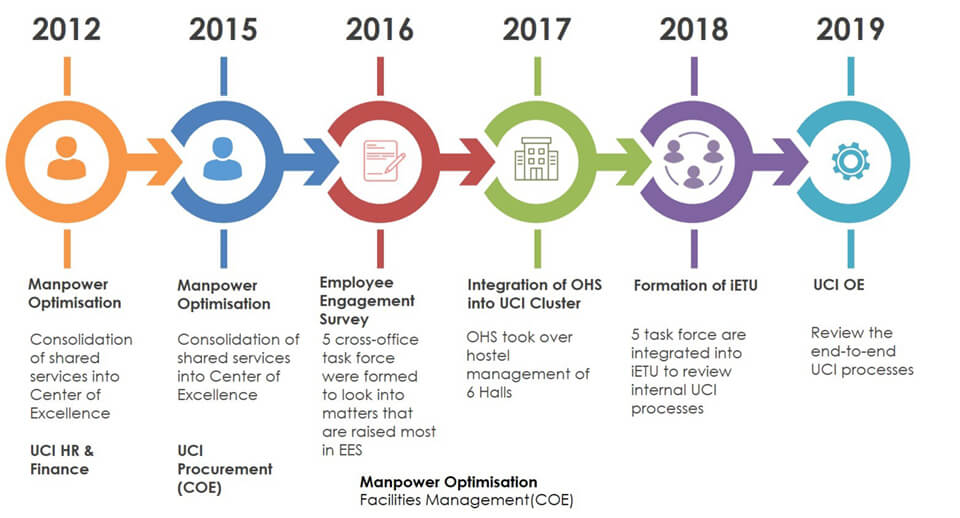The spirit of continuous improvement has always been part of the work culture at University Campus Infrastructure (UCI). In 2018, the UCI cluster formed its own Innovation Excellence Transformation Unit (iETU) to spearhead the execution of Organisational Excellence (OE) for UCI. However, the foundation has already been laid six years earlier, with preliminary work done to improve its operational processes, manpower optimisation projects and an employee engagement survey.

As a cluster of eight offices and two units, UCI started an OE process that included six phases – 1) Discovery, 2) Prioritisation, 3) Redesign, 4) Socialisation, 5) Implementation and 6) Post Implementation Review. The Discovery phase identified 10 critical initiatives to be developed.
Geraldine Lee, Director of Community Engagement and Development at UCI, observed that unfamiliarity with OE principles and tools, time allocation for detailed work plans and working with different offices were common challenges throughout the 10 initiatives. “To encourage staff to step out of their comfort zone, we shared the rationale and benefits of the initiatives to help them understand that the changes will lead to improved work productivity,” said Geraldine. She shared that staff involved in OE initiatives received full support from their management team, with help given to reprioritise their work to shift the focus to ongoing initiatives.
With commitment from both management and staff on the ground, one of UCI’s offices, the Office of Safety, Health and Environment (OSHE) focused on a review of its safety programmes. One initiative, which studied the necessity of pre and post-audit meetings before and after laboratory safety and health audits, led to post-audit Skype calls being carried out by staff as and when required instead of these meetings. The elimination of face-to-face meetings resulted in approximately 576 man hours saved annually.
The Initiative Owner (IO) of the pre and post-audit process, Danny Toh, Senior Associate Director at OSHE, shared that getting buy-in to the proposed changes was a key challenge. “To overcome the initial resistance, we actively involved staff from the three major stakeholders, NUS Medicine, Faculty of Engineering and Faculty of Science as team members to identify pain points and in developing the ‘as-is’ and ‘to-be’ processes,” said Danny.
Another OSHE initiative was to review the streamlining process of introducing and implementing new or enhanced safety and health programmes. The team proposed a university-wide series of consultation sessions before launching new programmes. These sessions would enable OSHE to understand and address stakeholder concerns, leading to improved programmes, a reduction of appeals and smoother implementation of new programmes.
Co-IO of this initiative, Lim Cheh Peng, Associate Director from OSHE, noted that gathering feedback and communicating the benefits to staff enabled them to gain support for the proposed changes.
Besides having a team of committed staff, the Business Process Re-engineering (BPR) training provided by the University also contributed to the success of both initiatives. The BPR framework, methodology and techniques were adopted to holistically and systematically analyse current processes. “As-is” (current process) and “To-be” (redesigned process) workshops were also conducted to engage stakeholders and ensure that their requirements were met.
Both Danny and Cheh Peng agreed that the teamwork spirit which was fostered through regular meetings between team members, and going the extra mile during the socialisation phase to gather feedback and share benefits with staff, were key drivers in the success of the initiatives.
Apart from 10 critical initiatives, the respective UCI offices are currently working on the remaining 96 OE initiatives, out of which 81% have been completed.
OE is a strategic initiative undertaken by the University to develop best practices for an efficient and world-class administration to better support NUS’ Vision and Mission. It aims to bring about improved work processes and policies as well as create opportunities for talent development and growth.